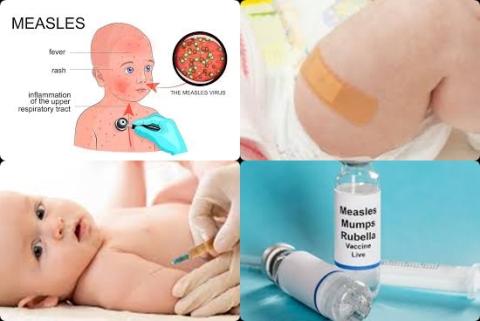
Objectives:
Measles is an important cause of death in children, despite the availability of safe and cost-saving measles-containing vaccines (MCVs). The first MCV dose (MCV1) is recommended at 9 months of age in countries with ongoing measles transmission and at 12 months in countries with low risk of measles.
The aim of this review article is to assess the benefits and risks of MCV1 in infants younger than 9 months.
Study design:
This review article included 56 studies (randomised and quasi-randomised controlled trials, outbreak investigations cohort and case-control studies).
No differences in the risk of adverse events after MCV1 administration were found between infants younger than 9 months and those aged 9 months of older.
Overall, the quality of evidence ranged from moderate to very low.
Results and conclusions:
The investigators found the proportion of infants who seroconverted increased from 50% [95% CI = 29-71] for those vaccinated with MCV1 at 4 months of age to 85% [95% CI = 69-97] for those were vaccinated at 8 months.
The investigators found the pooled geometric mean titre ratio for infants aged 4-8 months vaccinated with MCV1 compared with infants vaccinated with MCV1 at age 9 months or older was 0.46 [95% CI = 0.33-0.66, I2 = 99.9%, p 0.0001].
The investigators found only one study reported on avidity and suggested that there was lower avidity and a shorter duration of immunity following MCV1 administration at 6 months of age than at 9 months of age [p = 0.0016] or 12 months of age [p 0.001].
No effect of age at MCV1 administration on cellular immunity was found.
The investigators found one study reported that vaccine efficacy against laboratory-confirmed measles virus infection was 94% [95% CI = 74-98] in infants vaccinated with MCV1 at 4.5 months of age.
The investigators found the pooled vaccine effectiveness of MCV1 in infants younger than 9 months against measles was 58% [95% CI = 9-80, I2 = 84.9%, p 0.0001].
The investigators found the pooled vaccine effectiveness estimate from within-study comparisons of infants younger than 9 months vaccinated with MCV1 were 51% [95% CI = 44 to 83, I2 = 92.3%, p 0.0001] and for those aged 9 months and older at vaccination it was 83% [95% CI = 76-88, I2 = 93.8%, p 0.0001].
The investigators concluded MCV1 administered to infants younger than 9 months induces a good immune response, whereby the proportion of infants seroconverted increases with increased age at vaccination. A large proportion of infants receiving MCV1 before 9 months of age are protected and the vaccine is safe, although higher antibody titres and vaccine effectiveness are found when MCV1 is administered at older ages. Recommending MCV1 administration to infants younger than 9 months for those at high risk of measles is an important step towards reducing measles-related mortality and morbidity.
Original title:
Immunogenicity, effectiveness, and safety of measles vaccination in infants younger than 9 months: a systematic review and meta-analysis by Nic Lochlainn LM, de Gier B, [...], Hahné SJM.
Link:
https://www.ncbi.nlm.nih.gov/pubmed/31548079
Additional information of El Mondo:
Find more information/studies on vaccination and food fortification/malnutrition right here.